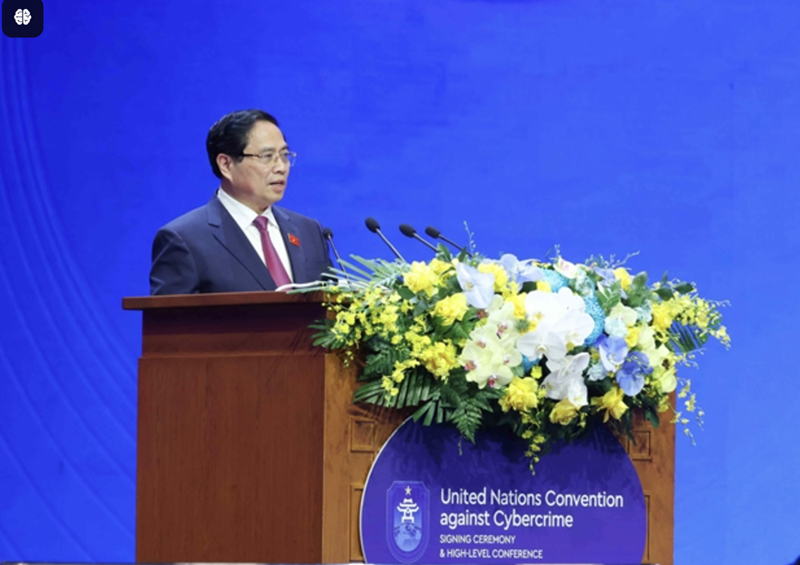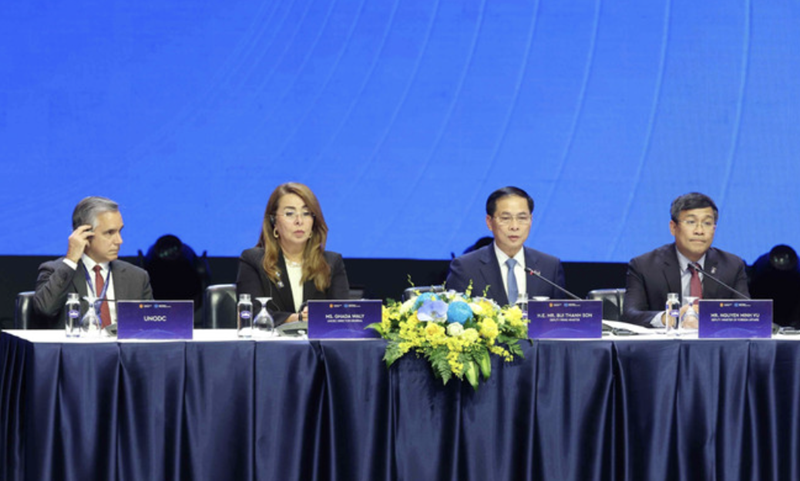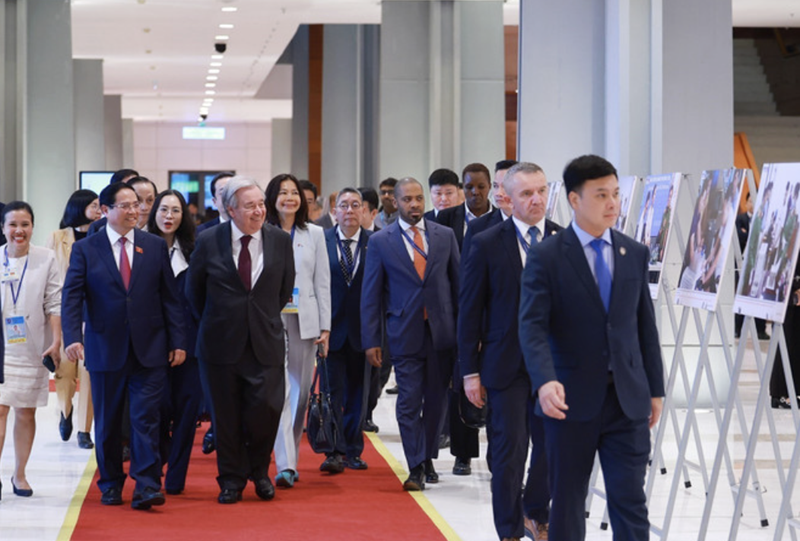The Vietnamese Government leader made the appeal during a high-level discussion co-chaired by Deputy PM Bui Thanh Son and Ghada Waly, Executive Director of the United Nations Office on Drugs and Crime (UNODC). The event was held within the framework of the Signing Ceremony and High-Level Conference of the United Nations Convention against Cybercrime (also known as Hanoi Convention) in the capital city.
    |
 |
|
Prime Minister Pham Minh Chinh speaks at the October 25 high-level discussion held within the framework of the Signing Ceremony and High-Level Conference of the United Nations Convention against Cybercrime. |
The session was attended by U.N. Secretary-General Antonio Guterres, Vietnamese State and Government leaders, and representatives from more than 110 countries and numerous international and regional organizations.
In his address, PM Pham Minh Chinh emphasized that digital transformation is not only an inevitable global trend and an objective requirement but also a strategic choice and top priority for every nation striving for fast and sustainable development.
However, he noted, this transformation also brings unprecedented risks, particularly cyberattacks and cybercrime. Ensuring cybersecurity and combating cybercrime is not a challenge confined to individual countries, but a shared responsibility of the entire international community.
The Government leader affirmed that Vietnam regards cybersecurity and cybercrime prevention as a pillar and backbone of its national digital transformation. The country has issued multiple laws, strategies, and action plans against cybercrime.
    |
 |
|
Vietnamese Deputy PM Bui Thanh Son (2nd from right) and Ghada Waly (2rd from left), Executive Director of the United Nations Office on Drugs and Crime (UNODC), co-chair the high-level discussion. |
Recognizing that no single nation is strong enough to fight cybercrime alone, Vietnam has consistently demonstrated proactive and responsible engagement, and remains ready to contribute to the common goal of global cybersecurity, he said. Hosting and promoting the signing ceremony of the Hanoi Convention stands as a clear testament to its commitment and efforts in this field.
He urged countries to work together to carry out five key actions to implement the convention effectively. They include enhancing international cooperation by establishing a robust partnership network among nations, international organizations, and major technology corporations; enhancing national legal frameworks in line with the convention; and enhancing investment in cybersecurity infrastructure. It is also necessary to enhance the development of specialized human resources and the improvement of skills of investigators and cyber response teams, while enhancing participation in the international legal frameworks on cyberspace.
Affirming the message of a peace-loving nation with aspirations for progress, the PM pledged that Vietnam will fully and seriously fulfill its obligations, working hand in hand with other member states to implement the convention to ensure that no one is left behind in the digital era.
Following the Vietnamese leader’s speech, representatives from 18 countries delivered remarks, with a large number of them expressing their national commitments to preventing and combating cybercrime and to strengthening international cooperation in information sharing, evidence exchange, the establishment of common standards for cyberspace governance, capacity building, and technical assistance.
Many commended Vietnam’s leadership and initiative in hosting the signing ceremony, and expressed the determination to ensure the convention’s full, effective, and practical implementation.
    |
 |
|
Prime Minister Pham Minh Chinh walks alongside U.N. Secretary-General Antonio Guterres at the event venue in Hanoi on October 25. |
In a message to the conference, the President of Russia affirmed that Russia stands ready to cooperate as closely as possible with the international community in this vital area.
The Vice President of Ecuador stressed that technological development must go hand in hand with promoting human security, human rights, and humanitarian values.
The Speaker of Legislative Chamber of the Oliy Majlis, Uzbekistan's lower house, noted that cybersecurity should be an essential component of national security. Meanwhile, the Deputy PM of Poland called for continued consensus in developing supplementary protocols, strengthening capacity building, and promoting joint responses to cybercrime based on responsibility, solidarity, and the rule of law.
Meanwhile, the Deputy PM of Cambodia stated the country’s commitment to building cybersecurity capacity, protecting citizens from online threats, and expanding cooperation with the private sector.
Australia, for its part, announced a contribution of 83.5 million USD to support the Southeast Asia and Pacific Cyber Program.
Source: VNA